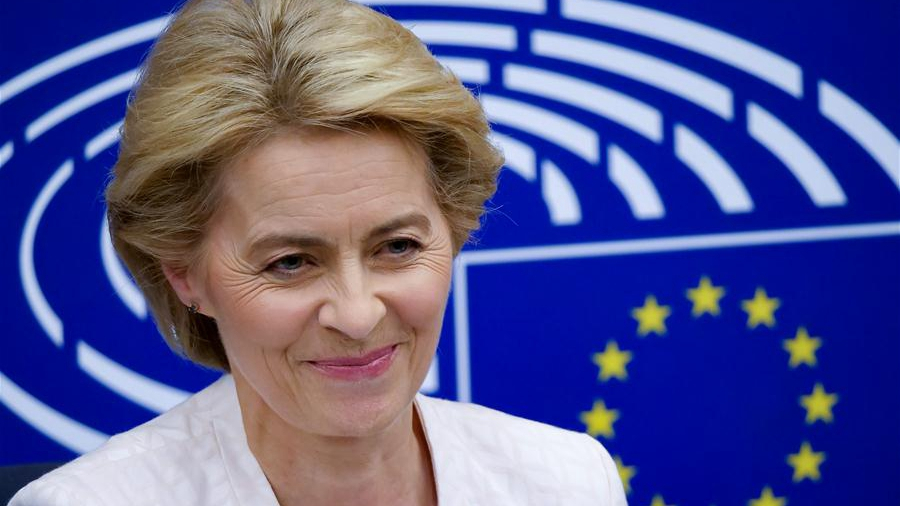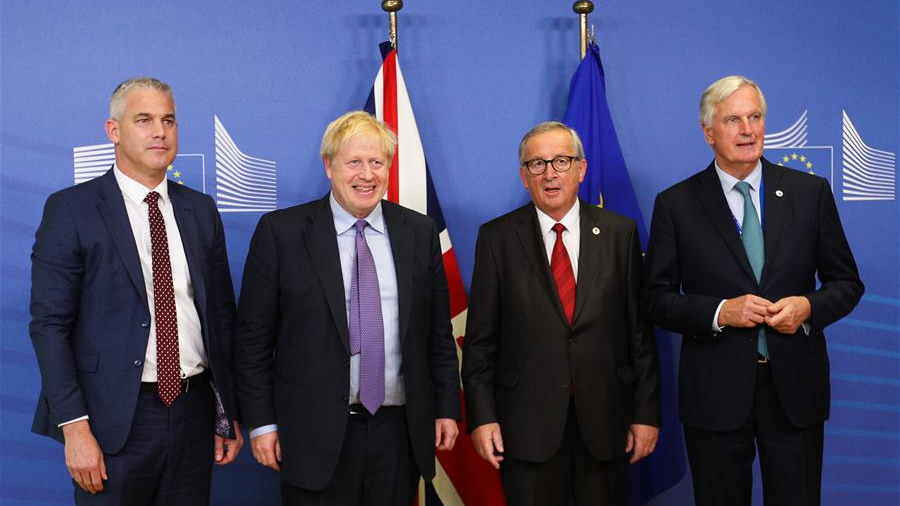
Editor's note: Jonathan Arnott is a former member of the European Parliament. The article reflects the author's opinions, and not necessarily the views of CGTN.
Speaking at Davos earlier today, European Commission President Ursula von der Leyen left her audience in no doubt that the European Union's number one priority would be to make the EU the world's first carbon-neutral continent by 2050. She also touched on Brexit, explaining that the EU was happy with the Withdrawal Agreement over citizens' rights, Ireland and the financial settlement (known colloquially in the British press as the "divorce bill"). The future, though, would be the Political Declaration – which is merely a roadmap describing the general direction of travel between the UK and the EU.
How these two issues interact and intertwine will be of huge significance, but also symbolic of future UK-EU relations as a whole. The EU's approach towards climate change has been clear and straightforward. It believes in binding targets and interim measures, forcing governments and businesses to duck under each target as it comes.
Jobs will be created and lost as stringent measures require new employment in environmental-related fields, while increased costs put others out of business. Other jobs will simply move overseas – the 27 countries of the EU do not exist as a vacuum. Companies may well import non-carbon-neutral components and raw materials from overseas, which, in effect, outsources the pollution, reducing the EU's net emissions but failing to reduce global emissions.
The consensus around climate change has been broadly left-wing until now, demanding that the EU must utilize punitive measures on the one hand, and environmental subsidies on the other, to reduce emissions. This consensus is the biggest reason why right-wingers are more likely than left-wingers not to believe that human-caused climate change will (if unchecked) lead to global catastrophe. Yet socialist economics are not the only way to reduce emissions.
The problem with the EU's target-driven approach is that it leads to poor interim decisions. Take solar panels for example. Seeking to comply with EU targets, the British government has been subsidizing them for years. Only now are the systems becoming sufficiently cost-effective that they provide value for money without substantial subsidy. It would be a stretch to say that this subsidy has driven the improvement in technology, given that the panels are generally imported.

L-R: British Brexit Secretary Stephen Barclay, British Prime Minister Boris Johnson, European Commission President Jean-Claude Juncker, and EU's chief Brexit negotiator Michel Barnier pose for photos after meeting the press at the European Commission headquarters in Brussels, Belgium, October 17, 2019. /Xinhua Photo
L-R: British Brexit Secretary Stephen Barclay, British Prime Minister Boris Johnson, European Commission President Jean-Claude Juncker, and EU's chief Brexit negotiator Michel Barnier pose for photos after meeting the press at the European Commission headquarters in Brussels, Belgium, October 17, 2019. /Xinhua Photo
An alternative approach would be to insist instead upon research and development, to ensure that we reach the point where greener technologies are naturally cheaper than polluting ones. When that happens, the free market will value the greener technology higher – and that technology will naturally spread faster. This approach would be palatable to capitalists and free-marketeers, cause far less collateral damage to the economy and mitigate job losses in the private sector. Such an approach might well appeal to Boris Johnson's Conservative government in the UK.
Ursula von der Leyen has repeatedly set out a simple principle: The more closely the UK is aligned to the EU, the less restricted the UK's access to the EU's Single Market will be. Conversely, the UK's stance is to remain sufficiently semi-detached from the EU that it is able to develop access to other markets across the world. The EU27's market is smaller than the U.S.'s alone, and the economies of China and India in particular are projected to grow massively within the next 30 years. The UK cannot demonstrate "added value" from Brexit unless it is able to develop those markets.
The UK might be happy with a "level playing field" if it means that both the UK and the EU are working towards the same aims, albeit in different ways. The Political Declaration maintains that both parties should retain the "common high standards," which apply at the end of the transition period in December. If the UK were to seek a different fundamental approach to lowering emissions than the EU's approach, would the two come into conflict? Climate change may well, in this case, become a metaphor for the whole of the Brexit negotiation process: exactly the same question will apply to a variety of other areas – state aid, taxation, social and employment standards to name just a few.
We already know that Ursula von der Leyen tends towards a "friendly but firm" approach, being very clear and immovable while explaining her views in the friendliest possible terms. Over the course of the coming months, we will learn something new about her. We will learn whether she also tends towards pragmatism or stubbornness. If she is pragmatic, the UK and the EU can enjoy good and relatively close trading relations for the foreseeable future. If she is stubborn, insisting that she wants the UK not just to do the same things as the EU but also in the same way, then the future relationship will be more distant.
(If you want to contribute and have specific expertise, please contact us at opinions@cgtn.com.)